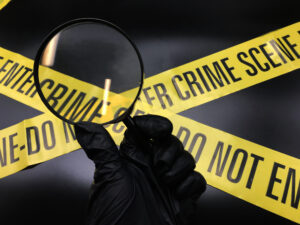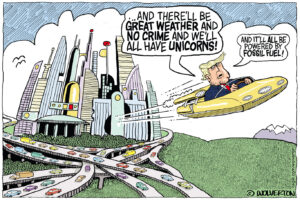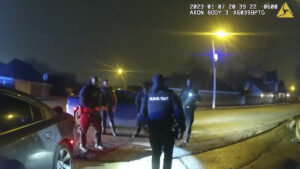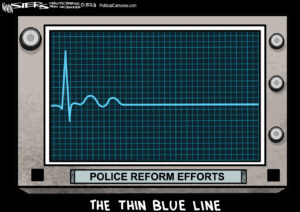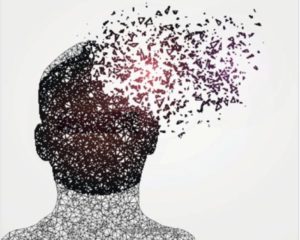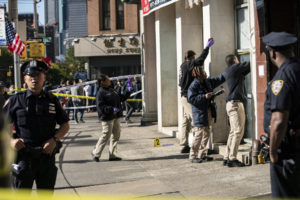What Can Skid Row Teach Us About the Future of Policing?
Longtime Police Officer Deon Joseph discusses homelessness, mental health and crime in L.A.’s most run-down district.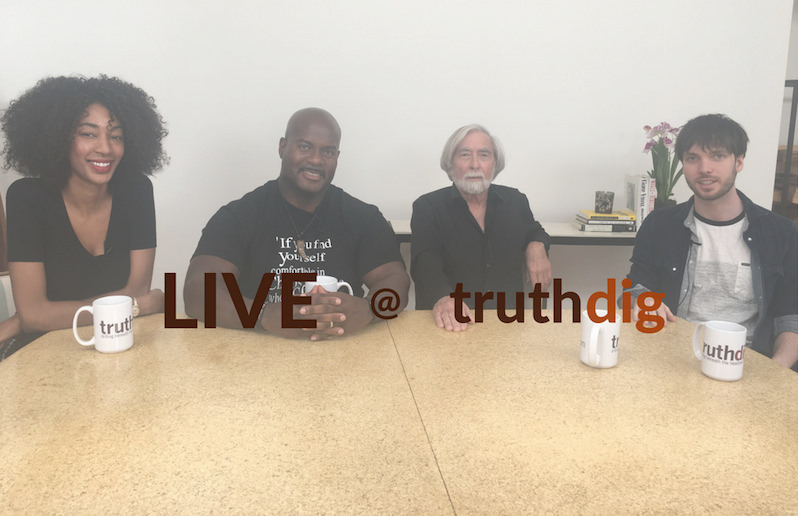
From left: Communications coordinator Sarah Wesley, LAPD Officer Deon Joseph, Editor in Chief Robert Scheer and contributor Donald Kaufman.
Deon Joseph, a Los Angeles police officer for almost 20 years, has been labeled an “angel cop” for his work with the homeless community on L.A.’s skid row. Joseph joined the Truthdig editorial team for a discussion streamed live to our Facebook page. Watch the full discussion below:
Skid row is a small section of downtown Los Angeles that contains one of the largest populations of homeless people in the United States. The area has high rates of crime and drug abuse and yet is only blocks away from some of L.A.’s most gentrified neighborhoods.
“Law enforcement is not the answer to homelessness. It is only part of the solution,” Joseph said during the live discussion.
“The only reason we are paying attention now is that we have gentrification downtown,” said Truthdig Editor in Chief Robert Scheer.
In a 2015 interview, Joseph explained how Angelenos rationalize the existence of skid row:
Skid row was created by two ideologies. It’s the extreme of “Not in my backyard. Let’s get these people out of our areas so they don’t lower our property values and we don’t have to deal with them.” Then you have the far left way of thinking: “Because these people are homeless, black or Hispanic, and mentally ill, law enforcement should take our hands off them completely and let them sleep on the sidewalk and do whatever they want.” Those two ideas are in Los Angeles and equally responsible for creating skid row.
Joseph has been involved in numerous outreach programs during his time working on skid row. He has helped local communities develop a mentor program called “Just Like U” and created a “Ladies’ Night” program to foster a positive relationship between women on skid row and the LAPD.
“[P]eople should know that we do more than arrest people,” Joseph said in his 2015 interview. “Over 10 years I’ve helped house about 150 people with transitional housing and services outside of skid row and have worked with the service providers in skid row to house individuals who were ready.”
He has also been a longtime advocate for those on skid row with mental health issues. In a 2014 opinion piece, Joseph argued that the situation was “a mental health state of emergency.”
“It is not the LAPD that has failed the mentally ill or the public. It is our society that has failed them,” he wrote. “We as a department are changing the way we do things for the safety of the community, and we are striving to develop stronger relationships with the people we serve. We need mental health agencies to do the same and join us.”
Other skid row organizations have praised Joseph’s work. NPR wrote in 2014:
Marcus Butler, security director at the Midnight Mission, one of the largest Skid Row shelters, says Joseph is that rare cop here who’s earned deep trust and respect within the neighborhood.
“When you see Deon Joseph in this police uniform and he’s a black policeman and he’s all muscles and big. But that’s not what you get. You get a person that cares, that asks what he can do to help,” Butler says.
What can other major cities learn from Joseph’s experience policing skid row? He says part of the answer is decentralization of skid row and that officers need to be held accountable. He also argues that it is not the LAPD’s place to enforce deportations.
“When we suit up, we leave our worldview in our locker,” Joseph told Truthdig. “We want you to come to us. We’re not in the business of deportation,”
Watch past editions of “Live at Truthdig” here.
—Posted by Emma Niles
Independent journalism is under threat and overshadowed by heavily funded mainstream media.
You can help level the playing field. Become a member.
Your tax-deductible contribution keeps us digging beneath the headlines to give you thought-provoking, investigative reporting and analysis that unearths what's really happening- without compromise.
Give today to support our courageous, independent journalists.
